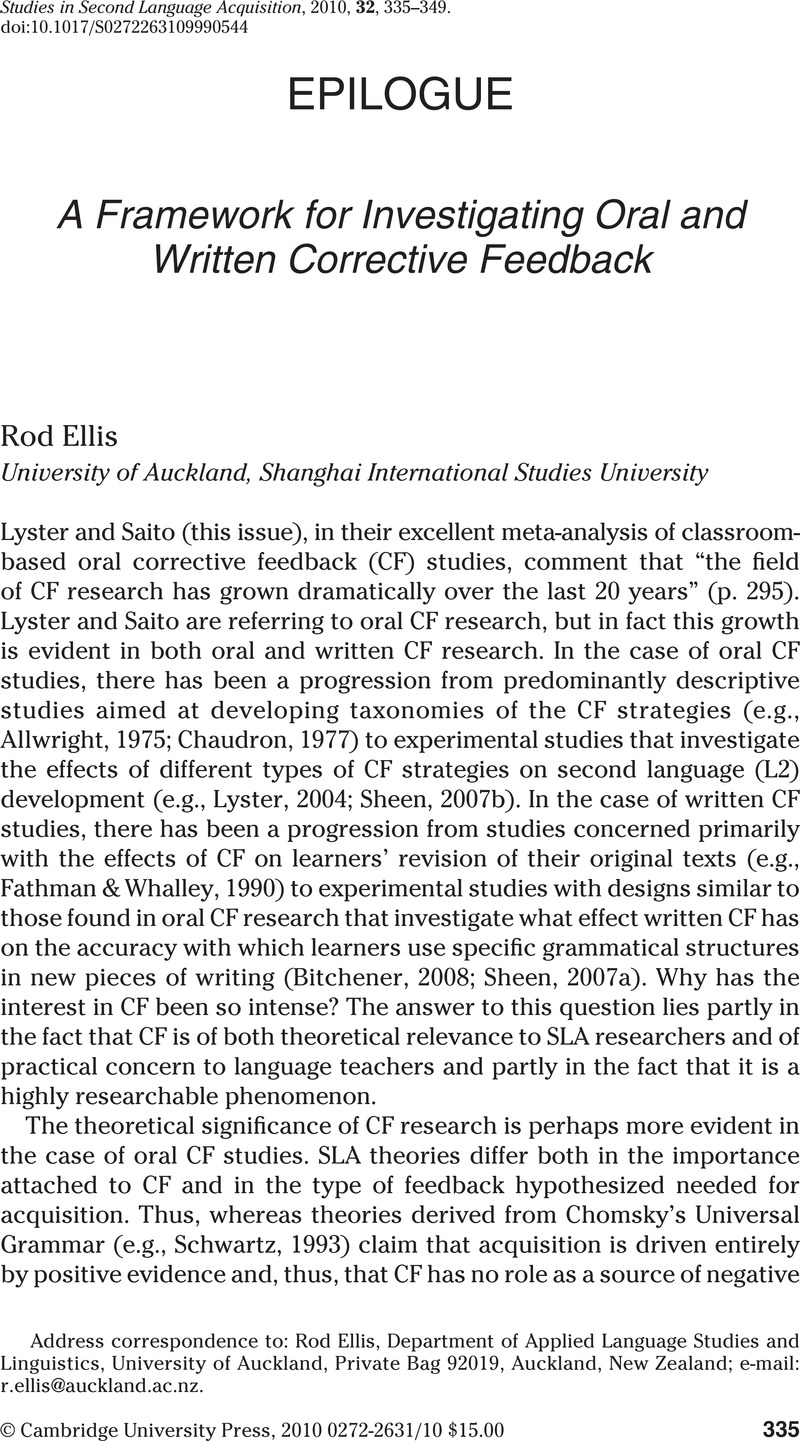Crossref Citations
This article has been cited by the following publications. This list is generated based on data provided by Crossref.
Penning de Vries, Bart
Cucchiarini, Catia
Strik, Helmer
and
van Hout, Roeland
2011.
Interdisciplinary Approaches to Adaptive Learning. A Look at the Neighbours.
Vol. 126,
Issue. ,
p.
1.
Riazantseva, Anastasia
2012.
Outcome measure of L2 writing as a mediator of the effects of corrective feedback on students' ability to write accurately.
System,
Vol. 40,
Issue. 3,
p.
421.
Pawlak, Mirosław
and
Tomczyk, Elżbieta
2013.
Language in Cognition and Affect.
p.
133.
Pawlak, Mirosław
2013.
Investigations in Teaching and Learning Languages.
p.
109.
Lee, Icy
2013.
Research into practice: Written corrective feedback.
Language Teaching,
Vol. 46,
Issue. 1,
p.
108.
Guénette, Danielle
and
Lyster, Roy
2013.
Written Corrective Feedback and Its Challenges for Pre-Service ESL Teachers.
The Canadian Modern Language Review,
Vol. 69,
Issue. 2,
p.
129.
Pawlak, Mirosław
2013.
Teaching and Researching English Accents in Native and Non-native Speakers.
p.
85.
Lillo Durán, Jorge
and
Ferreira Cabrera, Anita
2014.
Un modelo teórico-metodológico para investigación empírica en feedback correctivo escrito en una segunda lengua.
Onomázein Revista de lingüística, filología y traducción,
Vol. 30,
Issue. ,
p.
90.
Pawlak, Mirosław
2014.
Awareness in Action.
p.
69.
Zhang, Lawrence Jun
and
Rahimi, Muhammad
2014.
EFL learners' anxiety level and their beliefs about corrective feedback in oral communication classes.
System,
Vol. 42,
Issue. ,
p.
429.
Coyle, Yvette
and
Roca de Larios, Julio
2014.
EXPLORING THE ROLE PLAYED BY ERROR CORRECTION AND MODELS ON CHILDREN’S REPORTED NOTICING AND OUTPUT PRODUCTION IN A L2 WRITING TASK.
Studies in Second Language Acquisition,
Vol. 36,
Issue. 3,
p.
451.
Abbasian, Gholam-Reza
and
Bahmani, Poopak
2014.
Retrospective vs. Prospective Corrective Feedback Impacts on Developing EFL Learners’ Writing Ability and Learner Autonomy.
Theory and Practice in Language Studies,
Vol. 4,
Issue. 6,
Roothooft, Hanne
2014.
The relationship between adult EFL teachers' oral feedback practices and their beliefs.
System,
Vol. 46,
Issue. ,
p.
65.
Manchón, Rosa M.
2014.
Task-Based Language Learning – Insights from and for L2 Writing.
Vol. 7,
Issue. ,
p.
27.
Pawlak, Mirosław
2014.
Language Learning, Discourse and Communication.
p.
3.
de Vries, Bart Penning
Cucchiarini, Catia
Bodnar, Stephen
Strik, Helmer
and
van Hout, Roeland
2015.
Spoken grammar practice and feedback in an ASR-based CALL system.
Computer Assisted Language Learning,
Vol. 28,
Issue. 6,
p.
550.
Han, Ye
and
Hyland, Fiona
2015.
Exploring learner engagement with written corrective feedback in a Chinese tertiary EFL classroom.
Journal of Second Language Writing,
Vol. 30,
Issue. ,
p.
31.
Yousefi, Valiollah
2015.
Corrective feedback preferences among Iranian EFL students.
International Journal of Research Studies in Language Learning,
Vol. 4,
Issue. 5,
Mawlawi Diab, Nuwar
2015.
Effectiveness of written corrective feedback: Does type of error and type of correction matter?.
Assessing Writing,
Vol. 24,
Issue. ,
p.
16.
Sarandi, Hedayat
2016.
Oral Corrective Feedback: A Question of Classification and Application.
TESOL Quarterly,
Vol. 50,
Issue. 1,
p.
235.


